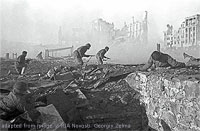Sacred beliefs: The painful legacy of WWII is made up of questions that cannot be answered

(Moscow News – themoscownews.com – Anna Arutunyan – May 13, 2013)
Anna Arutunyan is a correspondent and editor at themoscownews.com
The tanks and the Topol-M missile had all passed, the booming, Soviet-era voice of the announcer was quiet, the 11,000 uniformed servicemen were at ease, and the little boy standing on the curb of the Red Square suddenly spoke up.
“Who’s that?” he asked, pointing to a middle-aged man in a suit who was suddenly at the center of attention, surrounded by generals.
“That’s the president,” his mother said quietly, mindful of the security guards. “What kind of question is that?”
Every year in May, the spring days leading up to Victory Day are abuzz with the same questions: why is Central Moscow and Red Square blocked off to most residents, save for those who get to watch the military parade? Why were 40 million rubles spent on preventing rain, and up to 1 billion on general festivities, when the dwindling number of Russia’s World War II vets get about 27,000 rubles in pensions when their German counterparts get €1,000 (40,000 rubles)?
Why did Stalin shoot hundreds of Red Army commanders in the first few years of World War II? How, despite out-producing the Germans in the number of tanks, did Russian casualties reach an estimated 27 million against Germany’s estimated 6 million?
Then, the questions cease on May 9. Crowds fill empty streets, bypassing Red Square, headed to the parks. Those who are invited to the parade bask in the festiveness; many later attend a banquet in the Kremlin. The only question I heard that day came from the little boy who didn’t immediately recognize the president; when the parade was over, he also asked his mother why they had to go to the banquet instead of playing outside.
As a journalist out and about that day, I too didn’t ask questions because I didn’t want to inadvertently poke at the value of a vet’s sacrifice by asking him about pensions and losses. Instead, I tried to listen in to what people were saying.
The weight of the Great Patriotic War, as it is known in Russia, is as complex and controversial as the legacy of Soviet repressions. While many are annoyed that each anniversary is celebrated with so much pomp and circumstance as though we have no other achievements to celebrate they are also touchy about the sacred nature of the event. That’s why the uncomfortable questions peak in early May and cease into silence on the day itself. An eerie and perhaps necessary complacency settles in.
“Every year, there’s fewer and fewer veterans left who remember,” a woman in her thirties told a young kiosk vendor just off Manezh Square. The young vendor rejoined, “I don’t know what kind of country we’d have if it wasn’t for them, if we’d have a country at all.” And then she added, one modern woman talking to another, “That’s why I love and respect Stalin.”
Foreigners may balk at Russia’s Victory Day celebrations, either because they celebrate their victory more modestly, or because they don’t have so many unanswered questions piling up.
The president, speaking from the tribune, pointed out something that many Russians assume a priori that the people saved the world from Nazi domination. We are in the realm of sacred belief here. It shifts the focus from victory to sacrifice, because how else to account for the 27 million dead, over 14 percent of the population wiped out?
Given the historic post-traumatic stress disorder acquired during the war, it’s sacrifice we’re celebrating more than the victory, just as Russians place more importance on Easter, the crucifixion and resurrection of Christ, more than they do on Christmas.
Every historical question, every political debate about whether to feature posters of Stalin on Victory Day or not as was proposed in 2010 ultimately creeps up to a issue as loaded and devastating as a black hole, the one question we don’t want to ask because it can never be answered: was it worth the millions?
